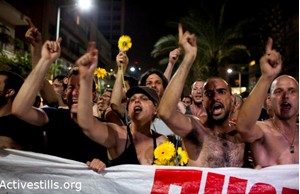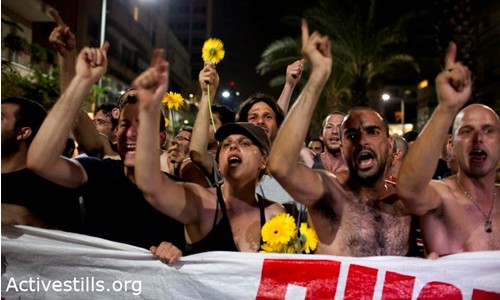
Could it be that Israelis, at least those supporting the tent city protests, have come to the conclusion that they themselves have been friers (suckers), willfully paying inflated prices on every item they purchase, a captive audience in a war- and taxes-rattled country surrounded by foes? The theme that keeps coming up in conversations between the protest tents cities all over Israel is one of feeling ripped off, with no real recourse other than to hit the streets.

“How long do you think this will last? Will it go anywhere?” According to Dr. Efraim Davidi, a well know union activist and lecturer at Ben-Gurion University, in an interview to Jerusalem Post daily newspaper. Dr. Davidi said to the Post journalist that the protest needs numbers if it’s going to have staying power. And for a movement that so far has had little if any Arab or Haredi (Jewish orthodox) participation, reaching a wider segment of the working class population is the key to increasing its potential influence as well.
“If there were over 1,000 tents, or if they had 100,000 people taking part and crying ‘Netanyahu degage‘ like in Cairo, it would make a bigger difference. It’s all about the political power that they can exert,” said Davidi in the interview, adding that while the numbers of protesters was still small, like in Athens, Madrid, Barcelona, Cairo and elsewhere it had been started by educated, working young people living in the Center of the country and sophisticated enough to not be sold a bill of goods by capitalist politicians.
He also said that those protesting in the street had every reason to feel they were being lied to and fed the image of Israel as a weak, permanently threatened country to force their complacency on social issues.
“You go out to a protest in Israel, and then you see the government talking about the flotilla or ‘fly-tilla’ or that [Iranian President Mahmoud] Ahmadinejad said this or that, and people start going home. The government always uses the security issue to silence the social and class protests. It’s always the language of the Shoah; they are coming to destroy us. But, we aren’t facing extermination, Israel is a country with a very large army, and it’s an occupation army.”
He added that “today, Israel is an advanced capitalist country, we have a large industrial and military complex, from aviation to cheese, all types of low-tech and hi-tech. We have nearly everything here.” Things in Israel, he asserted, are artificially over-priced, mainly due to the monopolies that practice price-fixing, and, he added, one need only travel to the occupied Palestinian territories or the Arab countries to see how much cheaper the cost of living is. He also wouldn’t rule out the possibility that the protests could reach a violent, all-or-nothing stage like elsewhere in the Middle East.
“There could be violent protests like all over the Middle East, there could be a change of power. People are very angry,” he notes, adding that “the big difference between Cairo and Tel Aviv is that it was a political thing. Here the people are political, but they haven’t gotten politicized to the point where they’re calling for an upheaval or a revolution. But who knows what could happen next week. If you had looked at Egypt eight months ago, you would have said it was a stable and neo-liberal government.” According to Davidi, “if the right-wing government continues this way, it will destroy the society. It has a great responsibility; people won’t just be happy with the crumbs they get from the government.”
Related:
Saturday night a mass rally at Tel Aviv against escalating housing prices


